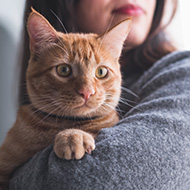
Cats Protection reveals findings of 2022 CATS Report.
More cat owners are struggling to access veterinary care, either because they cannot register their animal with a practice or seeing the cost of veterinary bills as a barrier, according to new research.
Findings from the 2022 Cats and Their Stats (CATS) report reveal that 37 per cent of cat owners have experienced trouble accessing their vet in the last 12 months. Long waiting lists, cancelled appointments and not taking on new clients were cited as the main reasons why cat owners have experienced difficulty getting an appointment.
Compiled by Cats Protection, the independent study also found that more owners are becoming increasingly concerned about the cost of veterinary care for their cat. Only a quarter (25%) of the cat owners who are worried about the economic crisis said they go to the vet as often as they would like, compared to 64 per cent of cat owners that are not concerned about living costs.
Concerningly, a minority of cat owners (seven per cent) fear that vets will ‘upsell’ treatments for their cat, particularly amongst those concerned about living costs.
Dr Maggie Roberts MRCVS, Cats Protection director of veterinary services, commented: “As the cost of living continues to rise in 2022 and beyond, both the veterinary profession and veterinary charitable sector will be faced with increasing numbers of cat owners in difficult financial circumstances. We must develop proactive strategies to reduce the impact on animal welfare brought about by this crisis."
Now in its third year, the CATS report contains a wealth of information, including owners’ views and experience of acquiring a cat, cat health and welfare, the benefits cat ownership provides, and the barriers to cat ownership.
To better understand how cats are living across the UK, the project surveyed more than 10,000 people who already own cats and those that would like to.
The results help Cats Protection highlight areas where cats' needs are not being sufficiently met, and to advocate for cats before lawmakers, decision-makers, and anyone else with the power to change the lives of cats in the UK.
Other findings from the report show that many cats continue to be imported into the UK. In the last 12 months, five per cent of cats (82,000) came from abroad, either from overseas charities or via specialist breeders located outside of the UK.
The report also highlights a rising trend toward pedigree cat ownership, with 38 per cent of cats acquired in the last year as a specific breed. Research suggests that pedigrees may be at greater risk of breed-related disorders, which can significantly impact their health and welfare.
Furthermore, the report shows that owners are increasingly keeping their cats indoors, particularly younger owners, those who live in urban areas and renters. Having an indoor cat is why 20 per cent of owners choose not to neuter their pet and why 27 per cent have not had their cat microchipped.
UK chief veterinary officer Christine Middlemiss said of the findings: "The combination of the COVID-19 pandemic and a general shift to buying pets online has brought in new challenges in the way we care for our cats. I welcome Cats Protection’s work to raise awareness and help consumers understand what the risks are, so they can make the right decisions to better protect the health and welfare of our cats."
To read the full report, click here



 The Veterinary Medicines Directorate (VMD) is inviting applications from veterinary students to attend a one-week extramural studies (EMS) placement in July 2026.
The Veterinary Medicines Directorate (VMD) is inviting applications from veterinary students to attend a one-week extramural studies (EMS) placement in July 2026.